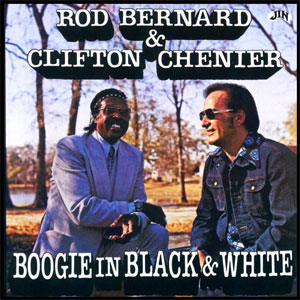Clifton Chenier & Rod Bernard
“Zydeco King Meets Swamp Pop Star in a Historic Jin Records Collaboration”
Quick Intro
Clifton Chenier & Rod Bernard—two legends from Opelousas, Louisiana—joined forces in 1976 to record Boogie in Black & White, a groundbreaking album released by Jin Records and published by Flat Town Music Co.. The record blended zydeco, swamp pop, and early rock ’n’ roll, and remains one of the most culturally significant collaborations in Louisiana music history.
In-Depth Profile
In 1976, swamp pop singer and TV personality Rod Bernard had a dream: to record an album with his hometown hero, Clifton Chenier, the internationally acclaimed “King of Zydeco.” The result was Boogie in Black & White, a 10-track LP recorded at Floyd Soileau’s Jin Studio in Ville Platte and released on Jin Records (LP-9014).
The album featured a racially integrated band at a time when Louisiana schools had only recently been desegregated. Chenier brought in his brother Cleveland Chenier on rubboard and saxophonist “Blind John” Hart. Bernard recruited swamp pop drummer Warren Storm, pianist Glenn Himel, guitarist James Stelly, and bassist Joe Hill. The ensemble ripped through R&B and rock ’n’ roll classics like “Kansas City,” “Shake Rattle & Roll,” “High Heel Sneakers,” and “Rockin’ Pneumonia and Boogie Woogie Flu,” all flavored with Chenier’s accordion and Bernard’s soulful vocals.
Released by Jin Records and published by Flat Town Music Co., the album was a regional hit and sold especially well in East Texas, where Chenier had a strong following. It was later reissued on cassette and CD (JIN-9014), with expanded liner notes by Bernard’s son, historian Shane Bernard. The project is now considered a precursor to the “zydecajun” style popularized by Wayne Toups and others.
The collaboration between Chenier and Bernard bridged cultural and musical divides, blending zydeco’s Creole roots with swamp pop’s Cajun soul. Their shared love of boogie, blues, and Louisiana rhythm made Boogie in Black & White a landmark recording—one that continues to inspire musicians across genres.
Their recordings reveal two artists at the height of their powers, celebrating the music they grew up on with joy, grit, and unity. The album remains a testament to Louisiana’s rich musical tapestry and the power of collaboration.
Signature Tracks
-
“My Babe” — a rollicking opener with Chenier’s accordion driving Bernard’s bluesy vocals
-
“Baby Where Did You Go Last Night” — co-written by Chenier and Bernard, a standout original track
-
“My Jolie Blonde” — Bernard’s Cajun roots shine in this heartfelt rendition of the Louisiana classic
Notable Accomplishments & Awards
-
Boogie in Black & White — released by Jin Records in 1976, reissued on CD in 2014
-
Published by Flat Town Music Co. — preserving the rights and legacy of the album
-
Featured in The Advertiser
Album Reviews
Boogie in Black & White
The Advertiser —Written by Herman Fuselier (September 2014)
““A wild and wooly rock ‘n’ roll set with spontaneity one normally only dreams about.”
An album titled “Boogie in Black & White” barely raises an eyebrow today in south Louisiana. But the story was much different story in 1976. Elementary and high schools in the state had just been reluctantly integrated six years earlier. Yet white singer Rod Bernard had a dream. Bernard was already known throughout the area as a TV celebrity and swamp pop singer. He had even hit the Billboard Top 20 and performed on national TV with his 1959 hit, “This Should Go On Forever.” But Bernard longed to record with a black musician who shared his same hometown of Opelousas — Clifton Chenier. “This recording is the final result of an idea I’ve had for many years: to record an album with the ‘Zydeco King,’ Clifton Chenier!,” Bernard wrote in 1976. “You see, I was raised on boogie and blues. My all-time favorites are Fats Domino, B. B. King, Chuck Berry, Jimmy Reed, and, of course …Clifton Chenier.” Bernard’s words, and the landmark album that carried them, have returned almost 40 years later. Jin Records of Ville Platte has re-released “Boogie in Black & White” on CD.
The disc contains the same 10 songs from the original recording, along with new, more extensive liner notes written by Rod’s son, historian Shane Bernard of New Iberia. In the late 1970s, “Boogie” became a hit for its hard-driving, accordion-flavored version of R&B and blues classics. It featured a racially-integrated band with some of the region’s most popular musicians. Chenier, who was already touring internationally with his Red Hot Louisiana Band, brought in two bandmates, his brother Cleveland on rubboard and saxophone ace John Hart. Singer and drummer Warren Storm, known for his 1958 national hit, “Prisoner’s Song,” provided the beat. Glenn Himel (piano), James Stelly (guitar) and Joe Hill (bass) rounded out the ensemble.
“The idea was simple,” wrote Bernard in the notes. “Pick ten ‘boogie’ songs, add Clifton’s unique accordion sound, throw in Cleveland’s scrubboard, let Warren set the beat and try to sing like hell!” The musicians gathered at Floyd Soileau’s Jin Studio in Ville Platte and ripped through “Kansas City, “Shake Rattle & Roll,” “True Fine Mama” and other early R&B and rock ‘n’ roll nuggets. In an interview, Soileau said reaction was strong at home and away. “That was the album we had the best sales in the east Texas area,” said Soileau. “I guess because Clifton was so popular in east Texas and the Houston area. We probably sold more there than in Louisiana. “We must have had some stations over there playing it that I didn’t know about and it created some demand. They liked those R&B hits with that zydeco style. It was just the right time and the right place. It turned out to be a great success.”
Praise came from as far as England. British music writer Bill Millar called the record “a wild and wooly rock ‘n’ roll set with spontaneity one normally only dreams about.” Baltimore music writer Larry Benicewicz suggested the album planted the seed for Wayne Toups’ “zydecajun” style and Zachary Richard’s 1984 “Zack Attack” album.
Soileau is thrilled to see “Boogie” back for a new generation to enjoy. “It was always in the back of my mind that we needed to do a digital version of that. I kept telling my son Chris and he said, ‘We got it on the list.’ “There was always something pushing back and I said ‘It’s past time. I want to see this in digital form before you put me six feet under.’ “I hope the folks will get a hard copy that they can show and present to the younger generation as a remembrance of this music. It was so hot back then. We have to pass that on to future generations.”

